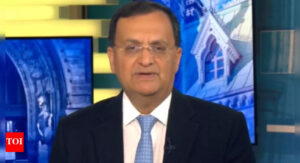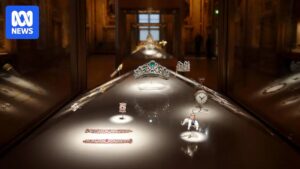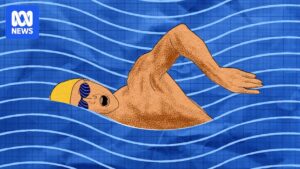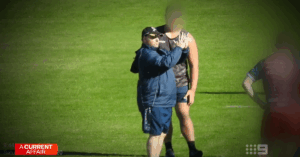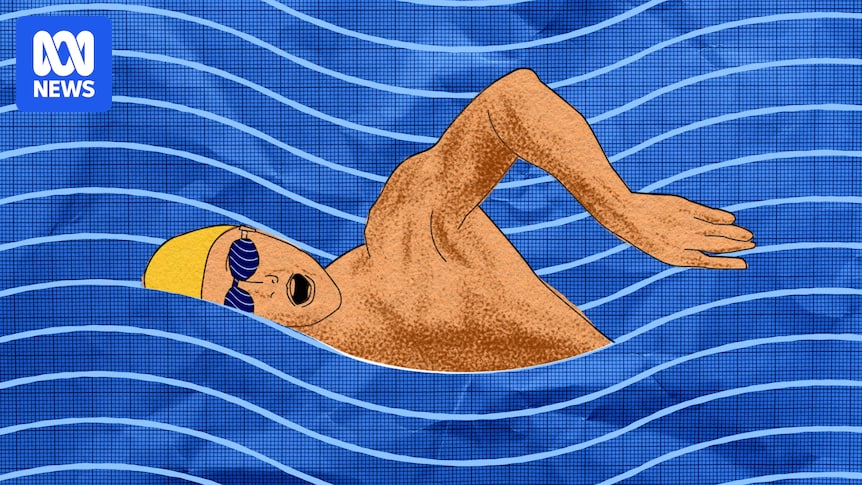
It takes just one breath. The moment Cameron McEvoy launches himself from the blocks, he breathes out, then takes a short, sharp breath in as he flies through the air. For the next 21 seconds, there are no more breaths taken as he breaks the surface of the water, glides underneath, then emerges — arms and legs in concert, powering him down one 50-meter freestyle lap of the pool.
Years of stretching every tendon and testing every joint in the gym, then training in the pool at max capacity, constantly on the edge of physical pain and discomfort, all for 21 seconds. From the stands or in front of the TV, all we see is a mad wash of arms, legs, and white water. But for McEvoy, every moment is finely tuned to come together in absolute harmony. “I’m basically in the hunt for perfection,” he says. The question is: how close can he go?
Quest to Blur Sports, Science, and Art
He’s arguably already the best 50m freestyler in the world. McEvoy won the gold medal at the world championships in Fukuoka in 2023 and followed it up with victory at the Olympic Games last year. At the Australian Swimming Trials in June, he jumped out of the water after winning the final of the 50m free in 21.3 seconds and said it was a “pretty nice swim”.
That swim remains the fastest time this year going into Friday’s heats at the world championships in Singapore, but McEvoy is after something more. “I’ve got that [Olympic] gold medal, and I’ve got the world championship gold medal. I guess you could say the chip is off the shoulder, or the leash is off, and I feel like I have free rein now to go after a time,” he tells ABC Sport.
The quest now is to blur the edges of sport, science, and art until the three disciplines are indistinguishable from one another. Much has been made of McEvoy’s university undergraduate degree in mathematics and physics. It was almost inevitable that in the Aussie sport tradition of exaggerating characteristics, he was nicknamed “The Professor”. But that scientific way of thinking has given McEvoy the tools to think critically about how he approaches the goal of swimming faster than anyone before him.
New Approach to Hone Technique
It began with tearing up the rule book on how to train a swimmer and critically examining the methods of other power athletes to see what he could apply in the pool. “You need to have the fitness to be able to sprint for 50m,” he says. “You need to have the strength to be able to apply that force to the water, and then you need to have the mobility to be able to do the shape of the freestyle stroke without having to fight against your own limitations in your body and the way your body moves.”
Rather than doing long hours in the pool swimming up to 30 kilometers per week, he spent far more time in the gym. Now he only swims two or three kilometers each week, but always at maximum intensity. His concept was to see the 50m as a series of individual components. Take his personal best swim of 21.06 seconds that won him the world title two years ago. “The way I break it down is you have your first 15-meter segment, and then you have your swimming part afterwards, which also can be broken down into its various components,” he says.
McEvoy’s first 15m in Fukuoka took 5.22 seconds — slower than his competitors and predecessors. He says knocking 0.2 of a second in that start is “low-hanging fruit” that could take him into world-record territory.
“The 50m race is a race where you start from a dead start on the block, but the jump is your highest velocity that you reach in the entire race. From the jump and the underwater up until your first stroke, you’re traveling at your fastest and then from your first stroke into the rest of the race, you’re slowly slowing down,” he says.
McEvoy Pools Passions for Swimming and Science
Cameron McEvoy’s undergraduate studies in physics and applied mathematics are never far from his mind, especially during those long training sessions. “When they perfectly align with each other, they kind of add to each other,” he says. “If they’re slightly off, or out of phase, then they can detract from each other.” But when he gets it right and those two waves are moving in sync: “It’s unreal.”
There are commonly used expressions in sport to describe that time when athletes are totally in the moment, when everything works without conscious thought or effort. People talk about the “flow state” or “being in the zone” — McEvoy cites Taoism. “There’s a Chinese saying called Wu Wei, which is something along the lines of ‘to not try’,” he says. “And that’s basically what it feels like. There’s a lot of complicated movements and timing happening within the stroke, but it honestly feels like you’re just cutting through the water like a hot knife through butter.”
McEvoy says it’s “the best feeling in the world”. “I remember Fukuoka vividly because I hadn’t felt that feeling in the water for such a long time,” he says. “I remember diving in, and I got to probably like the 20m mark and I could almost just observe what was happening, and it was almost as if I was in the front seat just watching the race unfold as opposed to consciously having to do anything.”
How ‘Not Trying’ Can Unlock McEvoy’s Best
Which explains why McEvoy is prepared to devote so much time, thought, and energy to shave off just a few fractions of a second from the 21 it takes to traverse the pool. He has reached a state where training his body and reaching for something close to perfection is as much art as it is sport or science.
To understand why, we have to go back to the year McEvoy took off after the Tokyo Olympics. He was working on his honors thesis in physics while throwing himself into other sporting pursuits like rock climbing. “I found when I had my time off that I was always drawn to some form of movement, some form of having to develop something where I’d go into whatever it was I was doing,” he says.
McEvoy equates it to the process of a musician composing a song, a painter transforming a canvas, or a sculptor chiseling away at a bit of marble. “They start off in one state and … they want to change it to something better in the future,” he says. “Except instead of using some other medium, it’s my own body being changed very slowly, over a very long period of time. The medium is myself, as a human being.”
The Impossible Hunt for Perfection
The goal now is to put everything together. The world record in the 50m freestyle of 20.91 seconds was set by Brazilian Cesar Cielo — one of just seven world records still standing from the supersuit era of 2008-09, when polyurethane suits were allowed. A huge number of world records tumbled during that time thanks to the suit’s buoyancy.
McEvoy believes Cielo’s time is “theoretically” within reach. “If you take my best start to 15m and my best 15m to 50m and combine them together, I’m 0.02 under the world record,” he says. “Whether or not it can be done in reality, that’s a different question that I’m trying to see if I can answer.”
But on any given day, something could go wrong. A stroke might be slightly out of alignment, or a kick is marginally out of sync. Perfection is never attainable — especially across heats, semifinals, and a final — so McEvoy operates in a contradiction. He’s aiming for as close as possible to perfection, while also trying to be consistently average. Just so long as that “average” is very, very good.
In 2022, Cameron McEvoy was done with swimming. But he has a new lease on his life in the pool, with ambitions to race at Brisbane’s 2032 Games. “I could have upwards of 500 reps under my belt of suiting up, replicating the race, and sprinting and training before I even get behind the blocks,” he says.
“Leaning into the scientific side of things, if I lay out all of my reps along a bell curve, then I want my 50th percentile to be good enough to win. And hopefully, we get to a point where that 50th percentile is good enough to potentially start setting some pretty incredible times.”
McEvoy’s not in a hurry. He knows his limited swim preparation may prevent him from winning the gold medal at this week’s world championships, but he’s got longer-term goals. “I would love to go to LA [2028 Olympics], and I’d love to have a chance to defend my title,” McEvoy says. And in the meantime, there’s that chance of swimming as fast as he possibly can.
At the age of 31 and a veteran of four Olympic Games, McEvoy has a complete life out of it. Earlier this year, he married his partner, Maddi, who just gave birth to their first child. Win or lose in Singapore, he’ll have a full program with son Hartley and a three-year runway into the LA Olympics. As for that physics thesis, well, that’s on hold.
“I’ll always have a foot in the door … learning about all of that stuff on a personal level,” he says. “But from a professional level, definitely right now I’m in a space that I love to be in. I’m very passionate about what I’m doing, not only for personal reasons and achieving what I want to achieve in the water racing the way I’m racing. But also with how the ideas I’m bringing to the table have already and will continue to change the sport forever in terms of how we view sprinting.”
It’s swimming, it’s science, and it’s art, and there’s still so much to discover.


